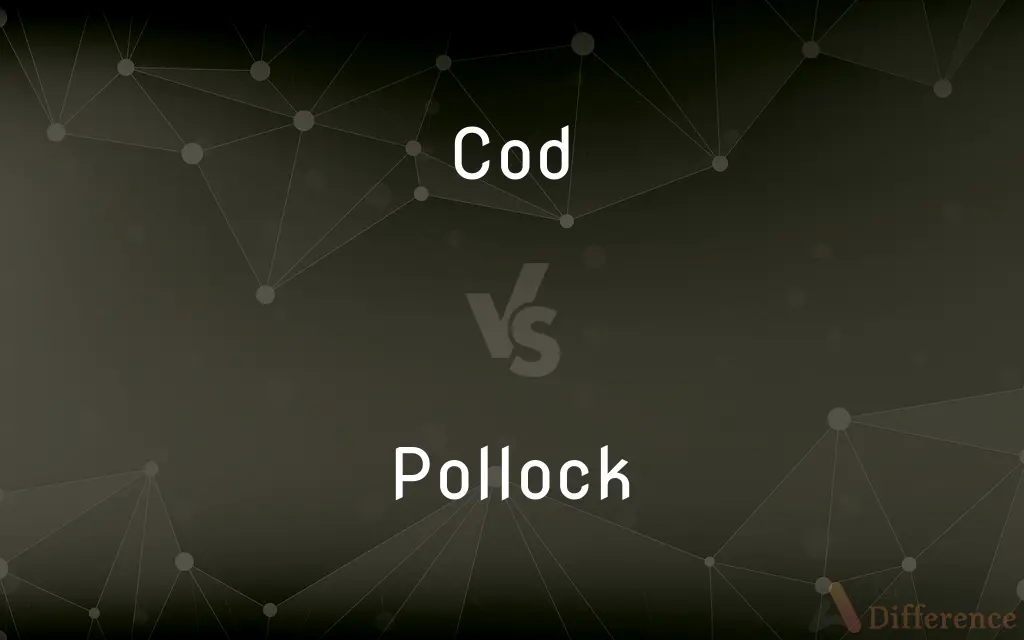Cod vs. Pollock — What's the Difference?
Edited by Tayyaba Rehman — By Maham Liaqat — Updated on March 24, 2024
Cod and Pollock are both popular fish in culinary use, with cod having a milder, slightly sweeter taste and firmer texture, while Pollock is known for its softer texture and stronger flavor.

Difference Between Cod and Pollock
Table of Contents
ADVERTISEMENT
Key Differences
Cod is prized for its mild, delicate flavor and firm, flaky texture, making it a favorite in a variety of dishes. It's commonly used in traditional recipes like fish and chips. Pollock, on the other hand, has a more pronounced fishy taste and a softer, less flaky texture, often used in processed foods like imitation crab meat and fish sticks.
Cod fisheries have been subject to stricter regulations due to overfishing concerns, which has impacted its availability and price. Whereas Pollock, being more abundant and easier to catch sustainably, is often marketed as a more eco-friendly and budget-friendly option.
Cod liver oil, derived from the liver of codfish, is a valuable source of vitamins A, D, and omega-3 fatty acids, widely used as a dietary supplement. Pollock oil, while also rich in omega-3s, is less commonly used and marketed, though it serves a similar nutritional purpose.
The habitat of cod, primarily found in colder waters of the North Atlantic, influences its texture and fat content. Pollock, primarily caught in the North Pacific, adapts differently to its environment, affecting its taste and nutritional profile.
In culinary circles, cod is often considered superior due to its texture and flavor, making it more desirable in fine dining. Pollock, while versatile, is frequently relegated to more casual or processed food products, reflecting its standing in the culinary hierarchy.
ADVERTISEMENT
Comparison Chart
Taste
Mild and slightly sweet
Stronger and more fishy
Texture
Firm and flaky
Softer and less flaky
Common Uses
Fish and chips, fine dining
Imitation crab, fish sticks
Sustainability
Subject to overfishing, stricter quotas
More abundant, considered more eco-friendly
Nutritional Products
Cod liver oil, rich in vitamins A and D
Pollock oil, rich in omega-3
Compare with Definitions
Cod
Cod is versatile in culinary uses.
From stews to fried dishes, cod's mild flavor makes it a culinary favorite.
Pollock
Pollock oil is less known but nutritionally valuable.
Like cod liver oil, Pollock oil offers beneficial omega-3 fatty acids.
Cod
Prized in fine dining.
Cod is often featured in upscale restaurant menus due to its esteemed texture and taste.
Pollock
More abundantly fished, offering a sustainable choice.
Due to its abundance, Pollock is considered a more sustainable seafood option.
Cod
A large, cold-water fish known for its mild flavor and firm texture.
Cod is often used in fish and chips for its ability to stay firm and flaky after cooking.
Pollock
A staple in casual and processed food.
Pollock's affordability and flavor profile make it a common choice for fast food fish sandwiches.
Cod
Cod liver oil is a popular health supplement.
Many take cod liver oil capsules for their omega-3 fatty acids and vitamins.
Pollock
A fish commonly found in the North Pacific with a stronger taste.
Pollock is frequently used in processed foods for its robust flavor.
Cod
Subject to overfishing, cod has seen varied quotas.
Cod quotas have been reduced to protect the species from overfishing.
Pollock
Often used in imitation crab meat.
Pollock's texture makes it suitable for creating imitation crab sticks.
Cod
Cod is the common name for the demersal fish genus Gadus, belonging to the family Gadidae. Cod is also used as part of the common name for a number of other fish species, and one species that belongs to genus Gadus is commonly not called cod (Alaska pollock, Gadus chalcogrammus).
Pollock
Pollock or pollack (pronounced ) is the common name used for either of the two species of North Atlantic marine fish in the genus Pollachius. Pollachius pollachius is referred to as pollock in both North America and the United Kingdom, while Pollachius virens is usually known as coley in the British Isles (derived from the older name coalfish).
Cod
See Atlantic cod.
Pollock
Any of various marine food fishes of the genera Pollachius and Theragra, closely related to the cod, especially T. chalcogramma of northern Pacific waters, often used for manufactured fish products.
Cod
Any of various marine fishes of the family Gadidae, which includes the Atlantic cod and the haddock.
Pollock
Either of two lean, white marine food fishes, of the genus Pollachius, in the cod family.
Cod
(Archaic) A husk or pod.
Pollock
To fish for pollock.
Cod
(Archaic) The scrotum.
Pollock
To splatter, as with paint.
Cod
(Obsolete) A bag.
Pollock
A marine gadoid fish (Pollachius carbonarius), native both of the European and American coasts. It is allied to the cod, and like it is salted and dried. In England it is called coalfish, lob, podley, podling, pollack, etc.
Cod
(obsolete) A small bag or pouch.
Pollock
United States artist famous for painting with a drip technique; a leader of abstract expressionism in America (1912-1956)
Cod
A husk or integument; a pod.
Pollock
Lean white flesh of North Atlantic fish; similar to codfish
Cod
The cocoon of a silkworm.
Pollock
Important food and game fish of northern seas (especially the northern Atlantic); related to cod
Cod
The scrotum (also in plural).
Cod
A pillow or cushion.
Cod
The Atlantic cod, Gadus morhua.
Cod
The sea fish of the genus Gadus generally, as inclusive of the Pacific cod (Gadus macrocephalus) and Greenland cod (Gadus ogac or Gadus macrocephalus ogac).
Cod
The sea fish of the family Gadidae which are sold as "cod", as haddock (Melanogrammus aeglefinus) and whiting (usually Merlangius merlangus).
Cod
Other unrelated fish which are similarly important to regional fisheries, as the hapuku and cultus cod.
Cod
Other unrelated fish which resemble the Atlantic cod, as the rock cod (Lotella rhacina) and blue cod (Parapercis colias).
Cod
A joke or an imitation.
I assume it all could just be a cod.
Cod
A stupid or foolish person.
He's making a right cod of himself.
Cod
Having the character of imitation; jocular. (now usually attributive, forming mostly compound adjectives).
“Illegitimi non carborundum” is a well-known example of cod Latin.
Dalton categorises Muse's latest composition as “cod-classical bombast”.
Cod
(Polari) Bad.
Cod
To attempt to deceive or confuse; To joke; To kid.
Cod
A husk; a pod; as, a peascod.
Cod
A small bag or pouch.
Cod
The scrotum.
Cod
A pillow or cushion.
Cod
An important edible fish (Gadus morrhua), taken in immense numbers on the northern coasts of Europe and America. It is especially abundant and large on the Grand Bank of Newfoundland. It is salted and dried in large quantities.
Cod
The vessel that contains the seeds of a plant (not the seeds themselves)
Cod
Lean white flesh of important North Atlantic food fish; usually baked or poached
Cod
Major food fish of arctic and cold-temperate waters
Cod
Fool or hoax;
The immigrant was duped because he trusted everyone
You can't fool me!
Cod
Harass with persistent criticism or carping;
The children teased the new teacher
Don't ride me so hard over my failure
His fellow workers razzed him when he wore a jacket and tie
Cod
Payment due by the recipient on delivery;
A collect call
The letter came collect
A COD parcel
Cod
Collecting the charges upon delivery;
Mail a package C.O.D.
Common Curiosities
Can I substitute Pollock for cod in recipes?
Yes, Pollock can substitute for cod, especially in dishes where its stronger flavor and softer texture won’t be a drawback.
Are cod and Pollock sustainable seafood choices?
Pollock is generally considered more sustainable than cod, due to more abundant populations and effective management.
What is the best cooking method for cod?
Cod is versatile and can be baked, fried, poached, or grilled, maintaining its texture across cooking methods.
Is Pollock good for frying?
Yes, Pollock can be fried and is often used in processed foods like fish sticks for its ability to absorb flavors.
How does the habitat affect the taste of these fish?
The colder waters for cod and the North Pacific habitat for Pollock influence their fat content, texture, and taste.
Can I get omega-3 fatty acids from both cod and Pollock?
Yes, both fish are excellent sources of omega-3 fatty acids, important for heart health.
Is there a significant price difference between cod and Pollock?
Yes, cod typically costs more than Pollock due to demand, sustainability concerns, and fishing quotas.
What's the main flavor difference between cod and Pollock?
Cod has a milder, slightly sweeter flavor, while Pollock is stronger and more fishy.
Why might someone choose Pollock over cod?
For budgetary reasons, preference for a stronger taste, or seeking a more sustainable seafood option.
Why is cod more expensive than Pollock?
Cod is often more expensive due to overfishing concerns, stricter quotas, and its popularity in culinary uses.
Which fish is better for making fish and chips?
Cod is traditionally preferred for fish and chips due to its firm texture and mild flavor.
How do cod and Pollock contribute to a healthy diet?
Both fish are low in fat, high in protein, and rich in omega-3 fatty acids, contributing to a balanced, healthy diet.
What nutritional benefits do cod and Pollock offer?
Both offer high-quality protein and omega-3 fatty acids, but cod liver oil is particularly noted for its vitamins A and D.
What is imitation crab made from?
Imitation crab is primarily made from Pollock, due to its texture and ability to be flavored.
How does overfishing impact cod availability?
Overfishing has led to reduced quotas and stricter regulations, affecting cod's availability and price.
Share Your Discovery

Previous Comparison
Acyl vs. Acetyl
Next Comparison
Harem vs. ServiceAuthor Spotlight
Written by
Maham LiaqatEdited by
Tayyaba RehmanTayyaba Rehman is a distinguished writer, currently serving as a primary contributor to askdifference.com. As a researcher in semantics and etymology, Tayyaba's passion for the complexity of languages and their distinctions has found a perfect home on the platform. Tayyaba delves into the intricacies of language, distinguishing between commonly confused words and phrases, thereby providing clarity for readers worldwide.















































